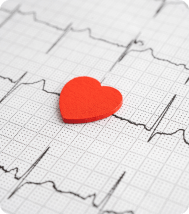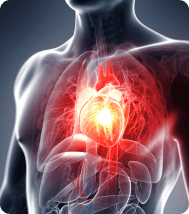Know the Difference: Heart Attack vs Heart Failure
Any heart disease is a health condition that should be taken seriously, as it may prove fatal if left uncontrolled and undetected. While heart attack and heart failure are two terms that sound similar and are sometimes mistakenly used interchangeably, they do have significant differences.
What is a heart attack?
A heart attack occurs when one or more of the coronary arteries are blocked by plaque and/or a blood clot, resulting in restricted blood flow. This causes segments of the heart muscles to die, leading to cardiac arrest.
Symptoms of a heart attack
Heart attack symptoms and their intensity vary from person to person. Some patients may display no signs at all, while others experience symptoms days or even weeks in advance. One biggest tell-tale sign might be recurrences of angina due to the temporary decrease of blood circulation in the heart.
Some common symptoms one should look out for include:
- Angina or a feeling of strong pressure or squeezing and aching sensation in the chest. This can extend to the arm, neck, jaw or back.
- Shortness of breath or a choking feeling
- Nausea or vomiting
- Lightheadedness
- Fatigue
- Coughing
Treatment for heart attack
When a patient suffers from a heart attack, every second is important for survival. Treatment options for heart attack include:
Emergency coronary angioplasty
This procedure aims to open the blocked arteries to restore blood circulation to the heart. It involves inserting a balloon catheter through a blood vessel and into the affected artery. A balloon is then inflated to widen the clogged artery. Angioplasty treatment often include stent insertion. This involves permanently placing a mesh stent into the artery to prevent it from narrowing, as well as to keep small plaque from forming.Coronary artery bypass surgery (CABG)
This surgery is recommended for severe cases when angioplasty does not suffice. It involves obtaining a healthy blood vessel from the leg, wrist or chest, and then attaching it to a section near the affected artery. This allows blood flow to bypass the clogged area. CABP is recommended for patients with a severely-narrowed left coronary artery, with two or more coronary arteries damaged, or with a dysfunctional pumping chamber.
Other less-invasive techniques to address a heart attack are available, including keyhole surgery, off-pump bypass surgery, endoscopic vein harvesting and radial artery harvesting.
What about a heart failure?
Heart failure is the chronic condition that leaves the heart muscles too weak, resulting in the heart not being able to pump blood throughout the body. It can be caused by repeated heart attacks, as these can impair the heart’s normal pumping function. Heart failure typically occurs gradually, but it is not uncommon for it to occur immediately following a heart attack.
The signs and symptoms of a heart failure include:
- Breathlessness, especially when lying down
- Fatigue and weakness
- Confusion
- Laboured or abnormal heartbeat
- Coughing, sometimes accompanied by a whistling sound
- Weight gain due to fluid retention
- Swelling of abdomen, legs, and ankles
- Angina, if a heart attack causes the heart failure
Treatment for heart failure
Treatment options for heart failure vary depending on its severity:
Medication
Patients may be prescribed medications that lower blood pressure or slow the heart rate. Diuretic pills are recommended for the removal of excess water from the body, which relieves swelling and breathlessness.Pacemakers or defibrillators
Both apparatuses regulate the heart’s pumping function and help maintain a normal heart rate. These are typically recommended for severe cases of heart failure.Pumping assist devices
Those with advanced heart failure may be introduced to mechanical pumping devices to help the heart pump blood normally from the heart to the rest of the body.Heart transplant
For severe cases in which the above treatments do not work, the diseased heart may be replaced with a healthier one from a donor.
Meet Our Cardiologist
MB BCh (Ireland), MRCP (United Kingdom)FAMS (Cardiology), DIP (CBNC, USA)FSCAI (SCAI, USA), FACC (ACC, USA) FESC (European Society of Cardiology, France) FRCP (Edinburgh, United Kingdom)

Dr Eric Hong is a dedicated cardiologist with over 20 years of experience caring for heart patients.
He is one of few cardiologists in Singapore who subspecialises in interventional cardiology, nuclear cardiology, and multi-modal cardiac imaging. Dr Hong garnered diverse experiences working in Ireland and the United States, and is double fellowship-trained in the USA.












